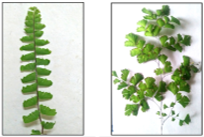Abstract
Increasing tendency of drug resistance and continuously emerging new diseases have limited the available therapeutic options. Plants are still a positive hope for search of new therapeutic agents, which have provided many effective therapeutic agents and have not been yet explored to their full potential. In the present study, two ferns Adiantum edgeworthii and Adiantum capilllus-veneris from the Himalayas, have been explored for the presence of antimicrobial peptides (AMPs) in them. Antimicrobial peptides are different class of therapeutic agents having multimodal action mechanism and different sites of action. Hence they could be a solution against the problem of drug resistance. In the present study, whole proteins (WPs) of the ferns were precipitated using TCA, and low molecular weight protein fractions (LMPFs) of WPs were isolated using SDS-PAGE. Antibacterial activities of WPs and LMPFs were tested against six human pathogenic bacteria S. aureus, S. pneumoniae, E. faecalis, and K. pneumoniae, P. aeruginosa and E. coli. The results showed that AMPs were present both the ferns and antibacterial potency of LMPFs was higher than WPs. It was also observed that WPs of A. capillus-veneris was about 11.4% more active than WPs of A. edgeworthii. Antibacterial activity of WPs was compared with two standard antibiotics (Amoxicillin and Erythromycin) and comparable results were obtained. Further research for purification and characterization of pure antimicrobial peptides from these plants are expected to provide new therapeutic agents.
Full text article
Authors

This work is licensed under a Creative Commons Attribution-NonCommercial-NoDerivatives 4.0 International License.

